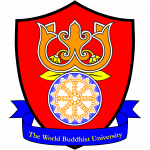Prayudh Payutto's Writings
Prayudh assumed the post of Deputy Abbot of Wat Phra Piren in 1973, but resigned three years later to dedicate himself to academic work. He published a number of books and articles, and regularly attended academic seminars and conferences, surrounding himself with contemporary scholars and intellectuals. He authored Buddhadhamma, recognized as a masterpiece among Buddhist scholars. He received honorary degrees from more than ten universities, both domestic and foreign. When he received UNESCO's Prize for Peace Education, he to the Ministry of Education of Thailand for the establishing of Phra Dhampitaka Education for Peace Foundation.
-
Sangha: The Ideal World Community.
-
From Ceylonese to Sri Lankan Buddhism.
-
Where women stand.
-
Aging and Dying.
-
Buddhism as the Foundation of Science.
-
Vision of the Dhamma, A Collection of Buddhist Writings in English
-
A Brief Introduction to the Buddha-Dhamma
-
A Constitution for Living
-
Beyond Tolerance and Pleasure
-
Buddhism and Education
-
Buddhism and The Business World
-
Buddhism, A Layman's Guide to Life
-
Buddhist Solutions for the Twenty-first Century
-
Dependent Origination- The Buddhist Law of Conditionality
-
Freedom- Individual and Social
-
Good Evil and Beyond- Kamma in the Buddha's teaching
-
Helping Yourself To Help Others
-
Jataka Tales Book I
-
Jataka Tales Book II
-
Looking to America To Solve Thailand's Problems
-
Samadhi in Buddhism
-
Sammasati- An Exposition of Right Mindfulness.
-
The Pali Canon- What a Buddhist Must Know
-
Toward Sustainable Science- A Buddhist Look at Trend in Scientific Development.
